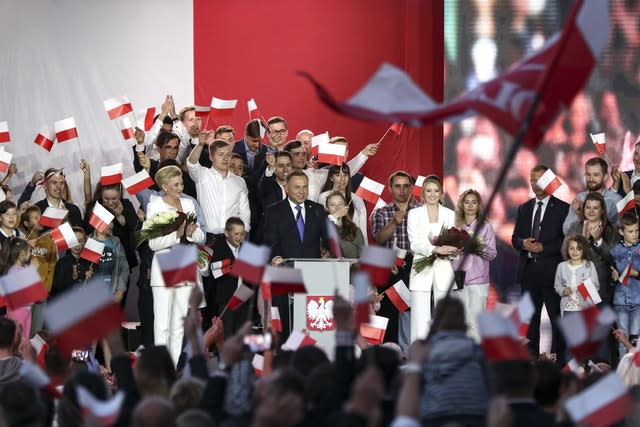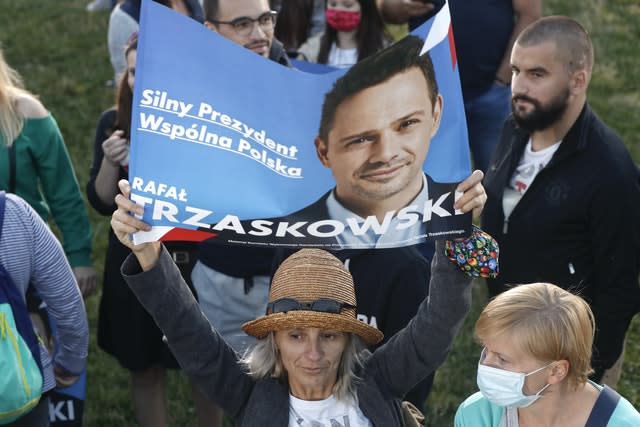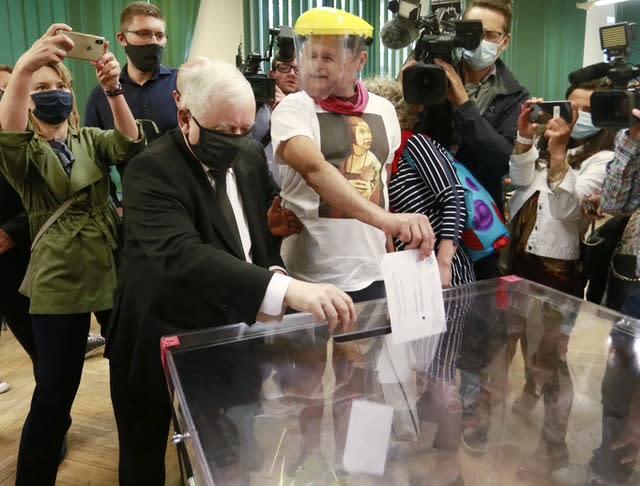Poland’s Andrzej Duda set for second term as president
Poland’s conservative President Andrzej Duda has narrowly won a second five-year term in a bitterly fought weekend election, defeating the liberal mayor of Warsaw, according to a near-complete count of votes.
The state electoral commission said Mr Duda had 51.21% of the ballot based on a count of votes from 99.97% districts, with his opponent, Rafal Trzaskowski, trailing on 48.79%.
The head of the commission, Sylwester Marciniak, said final official results would be announced later. They could vary slightly, but with Mr Duda having nearly half a million votes more than Mr Trzaskowski in the votes included in the preliminary count, they are not expected to reverse Mr Duda’s victory.

The very close race reflected the deep cultural divisions in the European Union nation.
It followed a bitter campaign dominated by issues of culture in which the government, state media and the influential Catholic church all mobilised in support of Mr Duda, a social conservative, and sought to stoke fears of Jews, LGBT people and Germans.
Mr Duda, who is backed by the ruling right-wing Law and Justice party, campaigned on traditional values and expanding popular social spending policies in the mostly Catholic nation.
The party’s policies, including hugely popular monthly cash bonuses of 500 zlotys (£100) per child to all families irrespective of income, have helped alleviate poverty in rural regions, and given all families more money to spend.
Mr Duda also had strong support among older Poles after he and the party lowered the retirement age and introduced a yearly cash bonus called a “13th pension”.

His supporters gave him and the party credit for making good on promises to reduce the economic inequality that came with the country’s transition from communism to a market economy three decades ago. There is a strong sense that the economic help also restored a sense of dignity to their lives.
But the party has also stoked conflict with the European Union with laws that have given it vast new powers over the top courts and judicial bodies.
Its leaders have used rhetoric discriminating against LGBT people and other minorities, and the party has turned public television into a propaganda tool used during the campaign to praise Mr Duda and cast Mr Trzaskowski in a bad light.
Sunday’s vote was originally planned for May but was delayed amid bitter political wrangling.

Mr Trzaskowski, a former European Parliament politician who jumped into the race late, had vowed to protect the country’s democratic values and unite the divided society, while preserving the popular welfare policies. He represented the centrist opposition Civic Platform party, which was in power in from 2007 to 2015.
As the race became tighter in recent weeks, Mr Duda turned further to the right in search of votes. He seized on gay rights as a key theme, denouncing the LGBT rights movement as an “ideology” worse than communism.
Mr Trzaskowski, as Warsaw mayor, had signed a tolerance declaration for LGBT people which triggered a nationwide backlash last year. The ruling party has often denounced LGBT rights as a foreign import that threatens Polish identity.
The EU has denounced the anti-gay rhetoric and some EU officials have called for funding to be denied to communities that declared themselves to be “LGBT free” – mostly a symbolic gesture with no legal meaning but which has triggered fear for gays and lesbians.
Mr Duda’s campaign also cast Mr Trzaskowski as someone who would sell out Polish families to Jewish interests, tapping into old anti-Semitic tropes in a country that was home to Europe’s largest Jewish community before it was decimated by Germany in the Holocaust.

Powerful ruling party leader Jaroslaw Kaczynski seized on Mr Trzaskowski having said in the past that Poland should still discuss Jewish demands to be compensated for pre-Second World War property that was seized from them.
Mr Kaczynski said it made one question whether Mr Trzaskowski really had a “Polish soul” and a “Polish heart”.
Mr Duda also lashed out at a German correspondent and a partly German-owned tabloid for their coverage, alleging that there had been “a German attack in these elections”.
The Foreign Ministry last week also summoned Germany’s top diplomat to complain about the coverage, while Angela Merkel’s government insisted it was not seeking to influence the elections or the work of a free press.

 Yahoo News
Yahoo News 
